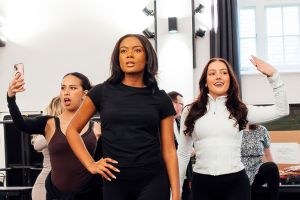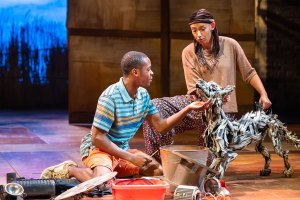Iestyn Davies talks about his life as a countertenor
Iestyn Davies is that rare breed of countertenor who refuses to be pigeonholed into any one particular musical niche, is as happy on the concert platform as he is on the operatic stage, and has garnered a plethora of enthusiastic reviews and prestigious engagements, which when you consider he only left the Royal Academy of Music only six years ago, is a pretty remarkable achievement by anyone’s standards.
We meet at the Coli between rehearsals for Christopher Alden’s new staging of Britten’s A Midsummer Night’s Dream where he sings the role of Oberon – a role he has sung only once before, in Neil Armfield’s staging in Houston, and given that countertenors are often still perceived as being ‘specialist’, I’m keen to find out why he chose this specific voice type to pursue a career as a singer. “Well I’ve been doing music all my life. My father is a ‘cellist so I grew up with that going on in the background and I started learning the piano when I was four and then became a chorister at eight in Cambridge. By the time I left at the age of thirteen I had been sucked into that world. I never thought ‘right – I’m going to be a countertenor’ so as I didn’t particularly think that I was going to be one I didn’t listen to James Bowman, and I knew of countertenors as they sang in choirs but I didn’t consider them to be to any different to any other voice part.”
After his voice broke Iestyn just left it to develop of its own accord, deciding not to take lessons and it was during a moment of boredom while singing in the school choir that he decided to sing the alto line, as it was something different to what he had been doing “and it felt nice and it had a nice feeling of resonance. It can be quite a good feeling to sing falsetto and the person standing next to me said ‘that sounds alright – you should take it more seriously’ so I did.
He went on to sing in the cathedral choir at Wells, then embarked on one of the Eton choral courses where he met his teacher David Lowe, who has taught him since he was seventeen. Then during his gap year someone gave Iestyn a CD of Andreas Scholl singing Bach Cantatas, “so I listened to that, and at the time he was performing in Handel’s Rodelinda at Glyndebourne so I watched that on video and that opened up to me the whole world of Handel opera and I then started listening to David Daniels as well.”
Iestyn is keen to point out that unlike other voice types, as a countertenor your voice doesn’t develop or change, “I mean you don’t get helden-countertenors, so you have to sing everything that there is. You can’t specialise – it would be career suicide if you decided that you were just going to sing Bach, so I try and do everything, maybe two or three operas and forty concerts a year but I don’t just want to be known as an opera singer or just a recitalist.”
One of the reasons why he counts himself fortunate to be enjoying such a busy and diverse career is down to having a good agent. “It makes a huge difference and I talk to young singers about this. Despite all the hard work you put in, and the practice and the money, at the end of the day if you spend your career with no agent or a bad agent it could ruin your career. You could be a great singer but if no one hears you because your agent isn’t ringing people up to come and listen you, then you will never get anywhere.” He cites being invited to sing Oberon in Houston as one of the most important moments in his career, “as Houston is a big opera house – what the Americans call one of the ‘A houses’, so it was very exciting” and is delighted to be a regular visitor to the Wigmore Hall, “where I have had amazing opportunities, thanks to John Gillhooly who is really on my side.”
He’s back in London to sing Oberon, in ENO’s new staging of A Midsummer Night’s Dream which is directed by Christopher Alden, so as you’d expect from this most probing of directors, there are no fairy wings, pointed ears or, indeed, a forest. “It’s set in a school. We’ve all been to school, hopefully, so everybody in the audience will have experienced something that they see in the production. It’s really direct which is one of the things I like about Chris as he comes with an idea on how he wants to do a piece. In this case it’s why did Britten choose this particular Shakespeare play? We’ve also discussed Britten’s fascination with working with children and if you read the brilliant book ‘Britten’s children’ there’s no real evidence that anything untoward happened, but Britten was aware that people thought this, and was ashamed of it but couldn’t let go because he was really excited by the naivety of a child doing music.”
Alden’s staging promises to be very different to the Robert Carsen staging that it replaces but without giving too much away “there will be a dream element to it, although in this version it’s more like Theseus’ dream as the whole opera is seen through his eyes.” After these performances of Oberon, Iestyn is looking forward to appearing at the Snape Proms in August when he gives a recital in the Maltings and he also returns to the USA to sing Unulfo in Rodelinda at the Met, make his Carnegie Hall debut, and appear as Eustazio in Rinaldo for the Lyric Opera of Chicago. He’s particularly excited about appearing at the Met in 2013 but can’t divulge the role or opera, but given that all the opera houses are celebrating Verdi, Wagner and Britten that year, it’s probably not too difficult to work out which mantle he’ll be taking on again.
Iestyn Davies sings Oberon in ENO’s new staging of A Midsummer Night’s Dream from 19 June. www.eno.org












